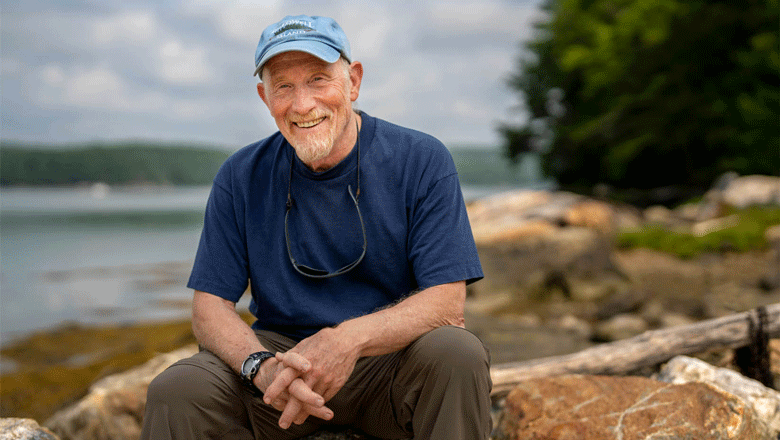When Bob Steneck came to the University of Maine in 1982, there were few marine ecologists in the state, and none interacted with fishermen.
He was among the first in Maine to work with lobstermen on research, traveling with them on their boats, diving to the seafloor to study lobsters, and sharing his findings with them.
At that time, there was a scientific consensus that the lobster population in the Gulf of Maine was declining. By working with lobstermen and diving down to the depths of the Gulf, Steneck showed that the population was actually on the rise.
Steneck’s work and that of his students and colleagues helped propel an expansion of and change in how lobster fisheries research is conducted in Maine. Over the proceeding decades, Steneck’s students continued collaborating with lobstermen and other fishermen on their studies. They focused more on work that benefitted these industries, the management of Maine fisheries, and the coastal communities that relied on them.
“We were able to take a different perspective by studying lobsters in their natural habitat. My hope was to do research to help the people of Maine,” Steneck says. “What came out of this work was research that was collaborative and directed toward improved management of the lobster fishery.”
After a 41-year career at UMaine filled with numerous studies, scientific publications, outreach, and teaching the next generation of marine scientists, conservation biologists and leaders, Steneck, professor emeritus of oceanography, marine biology and marine policy has retired.
Steneck’s research helped understand and manage Maine’s most lucrative fishery, now worth almost $400 million. He and his students learned how baby lobsters grow up on the seafloor, what lobsters eat, what eats them, and how they sustain their populations. This basic research was also useful for lobstermen, as well as fishery managers and policymakers who must determine the status and trends of lobster stocks.
In collaboration with his former student Rick Wahle, who most recently served as director of UMaine’s Lobster Institute, and other colleagues, Steneck discovered that as ocean temperatures rose over the years, lobster nursery grounds expanded in eastern Maine (northeast of Penobscot Bay), resulting in sharp increases in lobsters there. Warming temperatures elsewhere in the Gulf of Maine, however, may increase threats of disease and interactions with invasive species.
A few years ago, Steneck and his colleagues published another study warning that lobsters’ current abundance and high value may be creating a false sense of security. Specifically, they worried that the economic value of lobsters was masking the risks related to relying almost on a single species to maintain Maine’s maritime heritage. Maine’s marine economy would be in greater danger of collapsing if something happens to the lobster.
Over the past half century, Steneck has also conducted research on coral reefs in the Caribbean such as those surrounding St. Croix in the U.S. Virgin Islands, Mexico, Belize, Bonaire, and the Dominican Republic.
As a result of the coral reef research, reef managers and government officials in Bonaire and elsewhere banned parrotfish harvesting, prohibited certain traps, and established no fish zones. In Bonaire, these regulations provided a boon to their $50 million tourism industry.
“These are management changes that are a direct result from our coral reef class research and going down there for 20 years,” Steneck says.
“It was great that students got the chance to see applications come from their studies of Bonaire’s coral reefs.”
In addition to Wahle, some former students of Steneck include Carl Wilson, director of the Maine Department of Marine Resources’ Bureau of Marine Science; Elizabeth Stephenson, director of the Marine Conservation Action Fund; Amanda Leland, executive director of the Environmental Defense Fund; Susie Arnold, senior ocean scientist and director of the Center for Climate and Community for Island Institute; Ruleo Camacho, marine ecologist for the National Park Authority for Antigua and Barbuda; Jeanne Brown, communications and outreach coordinator for the Northeast Climate Science Center at the University of Massachusetts Amherst; and Kirt Moody, a professor of biology and environmental science at Columbia College.
“I’m really happy about not just getting my students through their academic programs, but also getting them started on their careers,” Steneck says. “When you teach students how to think, and you urge them to see the bigger picture, that’s really a better path to take than just teaching the traditional scientific methods,” he says.
Steneck says he is still engaged in marine science, conducting microscopy research at the Darling Marine Center and writing a textbook on coral reefs.





